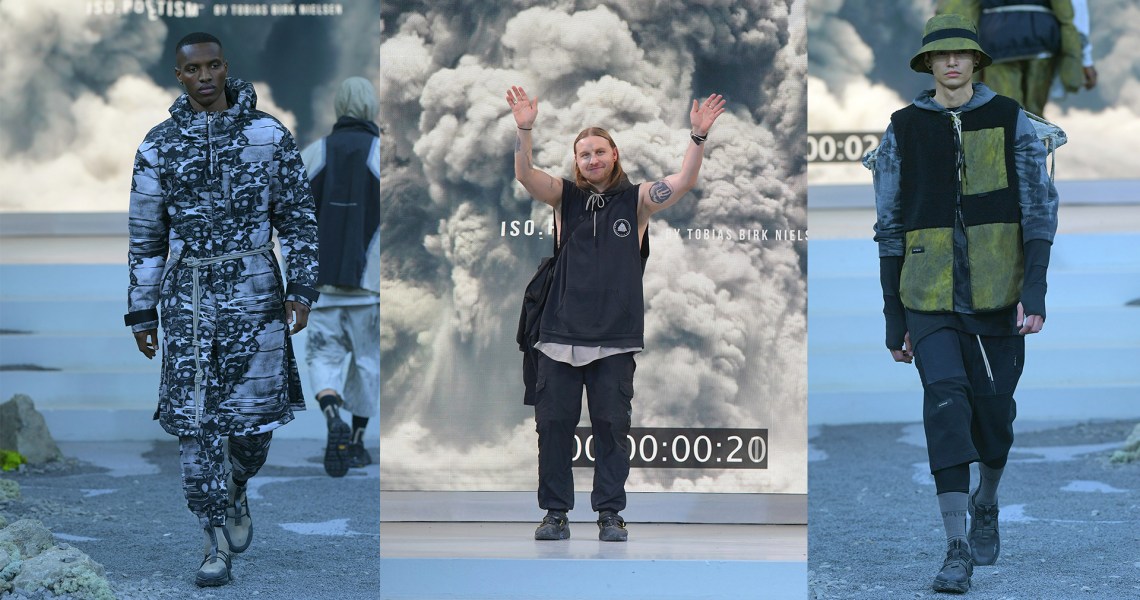To stay up-to-date on the latest runway shows, digital presentations and behind-the-scenes buzz, sign up to receive Glossy’s daily NYFW Briefing (February 11-16).
Copenhagen is leading on sustainability among its fashion week peers, with the organizers putting action behind their words.
As London is linked to innovation and New York to glamour, Copenhagen has come out as a force for sustainability, incubating brands including Ganni, Stine Goya and Malene Birger. Its current focus on investment in young, sustainable brands, like Iso.Poetism, shows the impetus has not slowed during the pandemic. And, timed with the Fall/Winter 2022 Copenhagen Fashion Week last week, organizers updated their Sustainability Action Plan, initially announced in 2020. It now includes a minimum set of standards that all brands showing at the event must conform to starting in 2023.
The Plan has also been extended to include brands involved in the CIFF (Copenhagen International Fashion Fair), the Norwegian Fashion Hub, Oslo Runway and the Icelandic Fashion Council. Therefore, as of 2023, approximately 1,600 brands will be pledging to not destroy unsold clothes; to use at least 50% certified-organic, upcycled or recycled textiles in all collections; to use only sustainable packaging and to use zero-waste set designs for their shows.
“All industry players, including fashion weeks, have to be accountable for their actions and be willing to change the way business is done, ” said Cecilie Thorsmark, CEO of Copenhagen Fashion Week, at the press conference for the launch of the plan. “The timeframe for averting the devastating effects of climate change on the planet and people is less than a decade, and we’re already witnessing its catastrophic impacts today. Put simply, there can be no status quo.”
The Plan also mandates carbon offsetting for brands and their invitee. It cites that, as Copenhagen is an “agenda-setting” fashion week, it is necessary for brands to fly in guests, but it encourages more sustainable forms of transportation like trains. For brands showing on the official schedule, carbon offsetting will be mandatory for participation starting in 2023. According to the updated Plan, more targets will be added to the Plan, with a 2025 deadline.
With the next generation of designers prioritizing the reuse and recycling of clothing in their designs, sustainability hub Copenhagen has become a key location for fashion brands across the Nordics and Europe to expand their credentials. That includes e-commerce giant and proponent of supporting sustainable collections Zalando. Berlin-based Zalando has previously explored circular fashion and has prioritized sustainability initiatives in its business objectives.
The e-commerce company has been running its annual Sustainability Award presented at Copenhagen Fashion Week since 2020, with an aim to encourage fashion brands to explore sustainable alternatives and recognize strategies that contribute to a more sustainable industry. The latest winner is streetwear brand Iso.Poetism by Tobias Birk Nielsen, announced last week. The brand was chosen for its initiative in recycling wherever possible, with a collection that used certified recycled materials with disclosed climate impacts. It made €500,000 ($570,000) in revenue in 2021 and has a large international audience.
“Until now, we’ve been making [more] sustainable decisions as part of a natural and logical process, and have been focusing on how to implement them internally, in everything from the design process to our logistical footsteps,” said Tobias Birk Nielsen, creative director at Iso.Poetism. “But being part of this has pushed us to start programming our sustainable approaches, and disseminating and communicating them and our sustainable ideas — not only internally, but also outside of our little, busy work bubble.”
As young, agile brands are seeing the success of the sustainability-focused brands nurtured by the Copenhagen Fashion Week, their motivation for creating successful sustainable brands is strong. Awards like Zalando’s facilitate necessary investment into key areas of responsible production.




